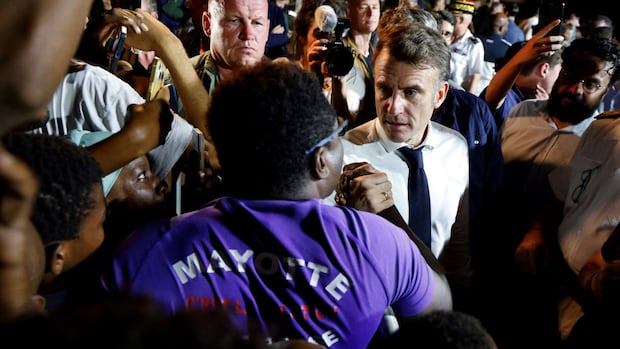Useful information
Prime News delivers timely, accurate news and insights on global events, politics, business, and technology
Useful information
Prime News delivers timely, accurate news and insights on global events, politics, business, and technology

French President Emmanuel Macron faced widespread frustration and anger from Mayotte residents during his visit to the Indian Ocean archipelago, which is still recovering from damage from the strongest cyclone to hit the region in almost a century.
On Friday morning, Macron visited a neighborhood of Tsingoni, on the main island of Mayotte, where people remain without access to drinking water or telephone service almost a week after Cyclone Chido.
As I walked through the area, some shouted, “We want water, we want water!”
Mayotte, with 320,000 residents and approximately 100,000 additional immigrants, is the poorest department in France. The cyclone devastated entire neighborhoods, as many people ignored warnings thinking that the storm would not be as extreme.
Can’t see the embed above? Watch the angry exchange here.
The tension was palpable on Thursday night, when Macron was booed by dozens of residents in Pamandzi, on Petite-Terre island, during the last stop of his first day in Mayotte.
People expressed frustration at the slow pace of relief efforts, with one woman making an impassioned plea and resisting Macron’s attempts to put his hand on her shoulder or grab the microphone to respond.
Macron finally got a microphone from someone else and said: “I have nothing to do with the cyclone. You can blame me, (but) it wasn’t me!”
Addressing the crowd, he acknowledged their difficulties.
“You have been through something terrible. Everyone is fighting, regardless of skin color,” he said, urging unity.
Macron in turn became angry and shouted that if it weren’t for France, residents would be in “10,000 times more shit.”
The French president added: “There is nowhere in the Indian Ocean where people receive so much help!” A woman was heard saying “we don’t agree.”
Macron is known for his appetite for debate and is used to being in crowds and facing people who are angry with him. He explained that he stayed two days in Mayotte out of “respect and consideration” for the population.
The French president received a warmer welcome in Tsingoni on Friday morning. People urged him to help, some posing for selfies with him and others showing him their children.

Meanwhile, the French army and local authorities were struggling to repair broken water pipes across the islands and bring water to villages that didn’t have it.
In the village of Mirereni, about 35 kilometers from the capital of Mayotte in the north, Civil Security agents were trying to remove a large felled mango tree that had broken a water pipe.
The pipeline supplies water to about 10,000 people in three nearby towns. But officials say repairing it could take a little longer than usual because of the heat, which affects the equipment.
Locals said they are worried that the lack of water could cause illness. Earlier this year there was a cholera outbreak on the island, with at least 200 cases.
At least 31 people died during the cyclone and about 2,500 people were injured, including 67 in serious condition, French authorities said. But hundreds or even thousands of people are feared dead in this densely populated territory.
French Health Minister Genevieve Darrieussecq said Friday that 17 percent of hospital staff and 40 percent of all regional health staff in the archipelago remain missing.
“There are between 60 and 70 people,” he said on the FranceInfo news channel, stressing that a large part of the population still does not have access to telephone services.